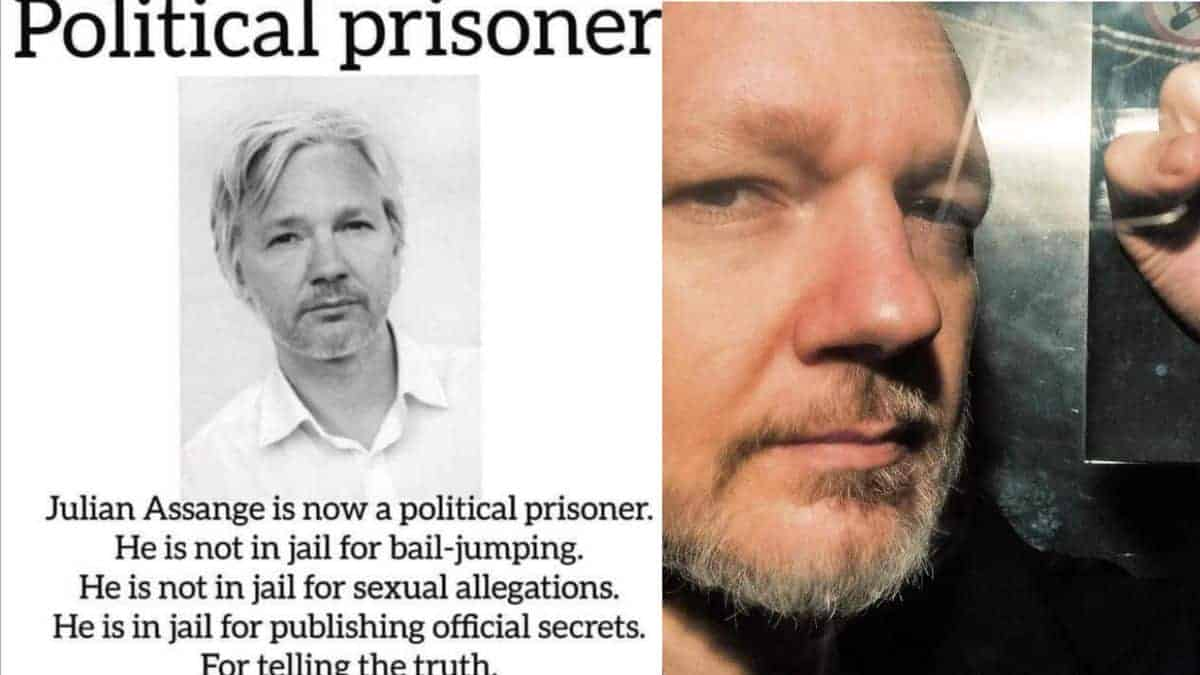Julian Assange is being referred to as a political prisoner by Kristinn Hrafnsson

WikiLeaks’ editor Kristinn Hrafnsson stated on Tuesday that the extradition case against Julian Assange is a highly political matter that poses a serious threat to the future of journalism.
Hrafnsson called WikiLeaks co-founder Assange a “political prisoner” during a special press conference hosted by the Foreign Press Association.
He remarked, “It is a highly political case. It was political in 2010 when the U.S. government wanted to take down the WikiLeaks. It was political when people were calling the assassination of Assange.”
When then-CIA Director and now-US Secretary of State Mike Pompeo described WikiLeaks as a “non-state hostile intelligence service” or when US Vice President Mike Pence travelled to Ecuador twice to persuade the Latin American country’s leaders to agree to extradite Assange in exchange for a $10 billion debt write-off from the IMF and the World Bank, the case became political, according to Hrafnsson.
He added, “I say repeatedly that Julian Assange is a political prisoner… and therefore we need to rely on politicians to turn this around,” adding that he “would not be worried at all” if it was a normal case “but this is a political case and what’s at stake is not just life of Julian Assange who faces 175 years of in prison if extradited; it is the future of journalism.”
“This is the greatest attack on journalism… in the world,” he stated emphatically.
WikiLeaks’ editor also stated that he last visited Assange about ten days ago and that his position has improved since his years of seclusion ended, but that “he is trying to get ready for the most important case of his life in absurd circumstances.”
Andrew Wilki, an independent Australian MP who spoke at the press conference, stated that extraditing Assange would create a dangerous precedent.
“This will establish a precedent that if you are a journalist who does anything that offends any government in the world, then you face the very real prospect of being extradited to that country,” he said.

Wilki agreed with Hrafnsson that the issue is “about the future of journalism.”
Another Australian Liberal Nationals MP, George Christensen, spoke at the conference, expressing his wish that British Prime Minister Boris Johnson “withdraws this matter that is before the courts.”
“I support [US President Donald] Trump and I support Bojo [Boris Johnson], but I’ll tell you what I value more: freedom of speech,” he remarked.
According to Christensen, Johnson recently stated that he considered the extradition arrangement with the United States was rather lopsided in favour of the United Kingdom.
One of the most significant extradition cases to be heard in British courts is set to begin next week.
The press conference took place on the same day as 117 doctors and psychologists from 18 nations signed a petition urging the British government to end Julian Assange’s “psychological abuse and medical negligence.”
According to a letter published earlier on Tuesday in the medical journal the Lancet, Assange would have “essentially been tortured to death” if he died in a British prison.
“Much of that abuse will have taken place in a prison medical facility, under the supervision of doctors,” it stated. The medical profession cannot afford to remain silent while such a farce unfolds on the wrong side of history and on the wrong side of torture.”
Julian Assange’s father, John Shipton, told the BBC on Tuesday morning: “The relentless anxiety that Julian has been under for now ten years, it has had a profoundly harmful effect.”
“I can’t speculate on his state of mind,” he added, “but I believe he’ll be very concerned because being transported to the United States is a death sentence.”
If Assange is extradited to the United States, he will face 18 counts of hacking US government systems and breaking espionage laws, as well as a possible long jail sentence.
Last year, he was pulled out of Ecuador’s embassy building in London, where he had been hiding for more than seven years.
He was arrested in 2012 for failing to pay his bond and on behalf of the United States due to an extradition demand, according to British police.
After failing to submit to security services, he was found guilty of breaking his bail terms in 2012 and sentenced to 50 weeks in prison by the Westminster Magistrates’ Court.
Assange was supposed to be released on September 22 of last year, but he’s being kept on “serious grounds” that he’ll flee.


